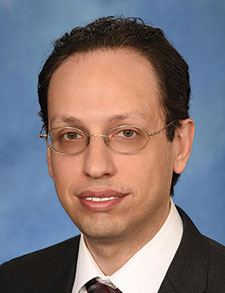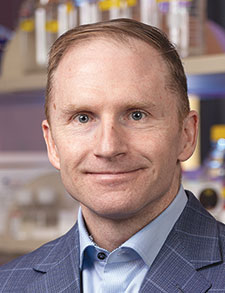The Triological Society has awarded more than $7 million to otolaryngologists to support their clinical and basic research through two competitive research grant programs since 2000. The Triological Society Research Career Development Awards provide funding to otolaryngologists for their research projects at an early faculty stage, before they have received funding from the National Institutes of Health (NIH). The Triological Society (TRIO)/American College of Surgeons (ACS) Clinician Scientist Development Awards provide additional funding to clinician–scientists to supplement mentored training grants from the NIH’s Career Development Awards, known as K awards.
Bradley J. Goldstein, MD, PhD, leads the research grants program for The Triological Society and is a professor and vice chair for research in the department of head and neck surgery and communication sciences at Duke University in Durham, N.C. He recently spoke with ENTtoday about the differences between the two awards, the eligibility criteria, and how applicants can prepare strong grant proposals.
ENTtoday: Why is awarding grants an important mission of the society?
Dr. Goldstein: The society’s mission is “to encourage and assist otolaryngologist–head and neck surgeons and other healthcare professionals to develop, maintain, and enhance their knowledge and skills in their pursuit of improved patient care through education, research, and fellowship.” A key aspect of achieving this mission is directly supporting career development research performed by early career otolaryngologist–head and neck surgeons. In turn, this can help early career faculty obtain grant funding from NIH or other highly competitive funding agencies to help develop future independent surgeon–scientists in our field. The Triological Society is the only otolaryngology academic society that requires a research thesis for full membership (i.e., fellowship), so supporting and funding career development research aligns with this philosophy.
ENTtoday: Why is it important to support early career otolaryngologist–head and neck surgeons?
Dr. Goldstein: After residency or fellowship training is a time when new or junior faculty must develop both their clinical practices and research niche. Carving out and protecting research time is key, along with developing relationships with research mentors, developing a track record of publication in the research field, and developing preliminary data to support grant applications. All of this requires support, mentoring, and seed funding.
ENTtoday: Where does the grant money come from?
Dr. Goldstein: TRIO budgets approximately $400,000 annually for these grants. The ACS provides additional funds for the combined TRIO/ACS grant program, available to surgeons holding K awards, which is the NIH grant program that supports research career development in either basic (K08) or clinical (K23) science.
ENTtoday: What is the difference between the two awards?
Dr. Goldstein: Career Development Awards are typically directed to junior faculty who have not yet received NIH funding. It is a $40,000 award for a period of 12 to 24 months, designed to help investigators develop rigorous preliminary data needed to support NIH grant applications. Projects generally focus on clinical research or basic science research but may include health services and outcomes research, as well as technology/procedure development. However, proposals should focus on a subject that broadly aligns with the goals of NIH funding announcements, so that successful completion would help the investigator prepare to apply for those awards.
The TRIO/ACS Clinician Scientist Development Awards are quite different and are directed to junior faculty who have an active NIH K grant, which is a mentored career development award that typically lasts five years. K awardees will need to convert their funding to an independent NIH R01 grant as the K award ends. This can be very challenging and highly competitive, so the TRIO/ACS awards are designed to provide additional funding to help K awardees boost productivity in preparation for successfully making the crucial K-to-R transition. It provides $80,000 per year for up to four years remaining on the K grant.
ENTtoday: What are the eligibility requirements for applying for a grant?
Dr. Goldstein: Candidates for the Career Development Award must hold a medical school faculty appointment at the assistant or associate professor level; must have completed all training (primary residency and/or fellowship) within the past seven years prior to submission; and should have no present or prior NIH funding. Applicants need a letter of support from the chair of their division or department.
Candidates for the TRIO/ACS award must be an otolaryngologist-head and neck surgeon holding a current NIH K grant with at least three years remaining.
ENTtoday: Who reviews the proposals, and how are funding decisions made?
Dr. Goldstein: A research grant review committee assembles qualified reviewers from the society’s membership to evaluate grant applications. The merit-based review process is based on the model used at NIH study sections. Triological Society leadership provides final funding approval, based on the number of meritorious proposals and availability of budgeted funds. Detailed feedback is provided; unsuccessful applicants may reapply if they remain eligible.
ENTtoday: What types of research/content make for a good grant proposal—
one that’s likely to be successful?
Dr. Goldstein: Similar to the format for NIH grants, reviewers assess the research question’s significance and the feasibility of proposed research approaches. The types of analysis or outcome measures need to be clear, and meaningful conclusions should be able to be drawn if the proposed experiments are completed. Having a track record with prior academic or research productivity is helpful.
ENTtoday: What are some common mistakes people should avoid—that could result in an unsuccessful application—when submitting grant proposals?
Dr. Goldstein: Grants that do not propose well-defined, hypothesis-driven work tend to be more difficult to assess and, therefore, are less likely to be scored competitively. Proposals that are either too thin or overambitious may be less likely to succeed because of the potential challenges they pose. A research approach must be feasible, which also means that the anticipated outcomes and analyses need to be described well.
ENTtoday: Do you have any advice or tips on how to write a great grant proposal?
Dr. Goldstein: I recommend identifying good mentors and then taking their advice. This would be a good time to mention that The Triological Society is embarking on a new program, funded by an R25 grant from the National Institute on Deafness and Other Communication Disorders, to help develop and grow a
mentoring network. Among other initiatives, the program will provide a way to formally connect with mentors nationwide and across the breadth of otolaryngology subspecialties. More details will be announced soon. Another tip is to take advantage of grant-writing courses or seminars offered at medical schools.
ENTtoday: Would you encourage members to apply for grants?
Dr. Goldstein: Absolutely! The society is eager to receive applications and seeks to promote research career development. Although not every grant request can be funded, organizing research ideas into grant proposals, as well as receiving mentorship, advice, and critical feedback, are all valuable and can help early career otolaryngologists–head and neck surgeons who are resubmitting a proposal—whether it’s The Triological Society, other foundations, or NIH.
Learn more about TRIO’s Clinician Scientist Development and Research Career Development Awards.
Karen Appold is an award-winning journalist based in Lehigh Valley, Pa.
Grant Winners Offer Advice, Share Success Stories
Receiving The Triological Society/American College of Surgeons Clinician Scientist Development Award in 2015 helped Steven Eliades, MD, PhD, associate professor in the department of head and neck surgery and communication sciences at Duke University School of Medicine in Durham, N.C., establish himself as an independent investigator.
When applying for a grant, Dr. Eliades, whose research interests include brain mechanisms and the basic neurobiology of hearing, advises members not to be too ambitious, especially early on. “Propose something achievable within a few years, particularly given the time pressures on new surgeon–scientists,” he said. “Have a strong mentorship plan, as well. Successful training grants and fellowships, like the K mechanism, almost depend as much on your mentor as they do on your science.”
Rick F. Nelson, MD, PhD, professor of otolaryngology and neurosurgery in the department of otolaryngology–head and neck surgery at Indiana University in Indianapolis, who received The Triological Society/American College of Surgeons Clinician Scientist Development Award in 2017, studies the common hearing loss gene, TMPRSS3, and its functional role within the cochlea.
The grant supplemented his K08 award from the NIH, helping to fund his research efforts and enabling him to hire additional research personnel. This expedited his research productivity and accelerated his ability to generate data for publications as well as preliminary data for his successful R01, he said.
When writing a meritorious grant proposal, Dr. Nelson recommends starting with your specific goal—which is typically hypothesis-driven. “Aim to generate high-quality preliminary data,” he said. “Seek collaborations to strengthen your proposal. Consult scientists and mentors with similar expertise, who can provide constructive feedback and review your proposal six to eight weeks before submission.”
“Don’t be discouraged if your first few attempts to get your grant proposal accepted don’t succeed,” said Dr. Eliades, whose recent efforts have primarily focused on the neural mechanism of vocal communication, including both vocal production and perception and how the two interact. “Keep at it. Most likely, your mentors have had similar experiences.”

